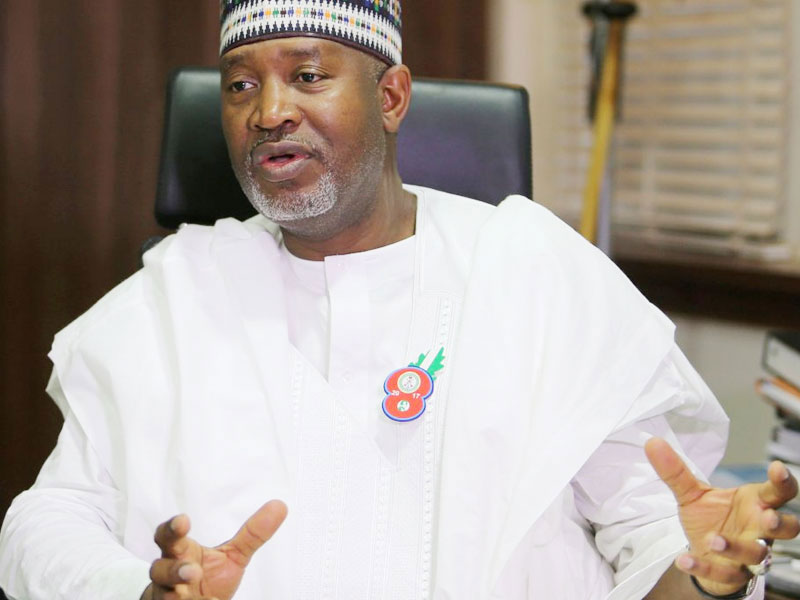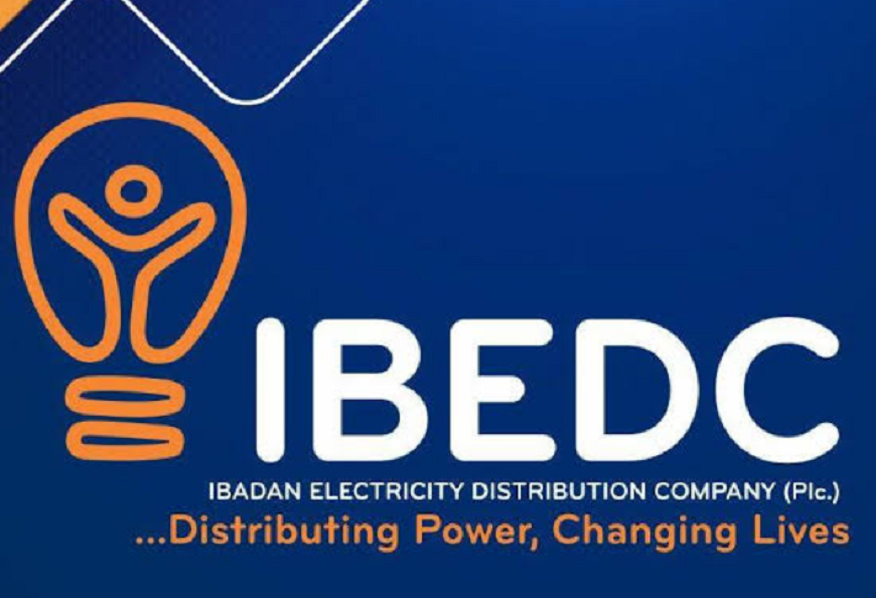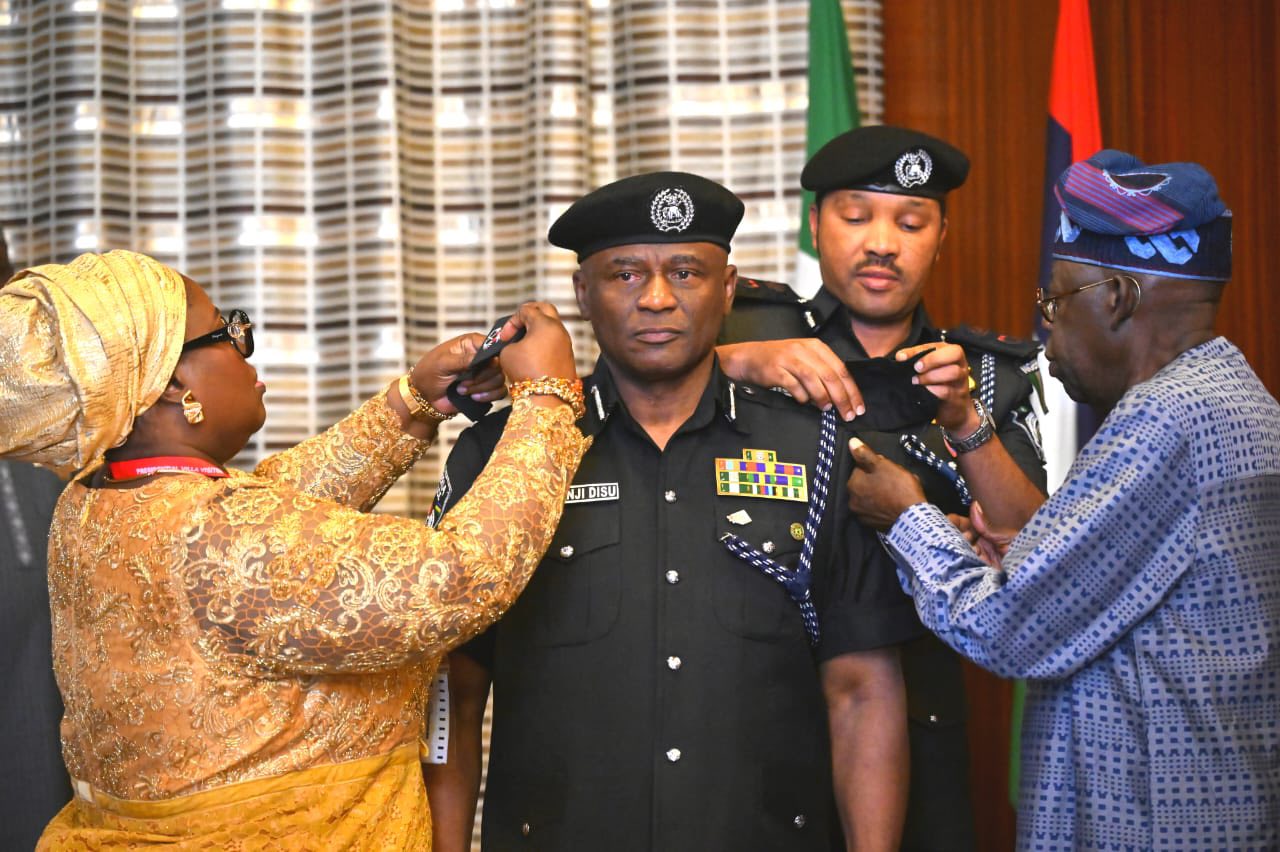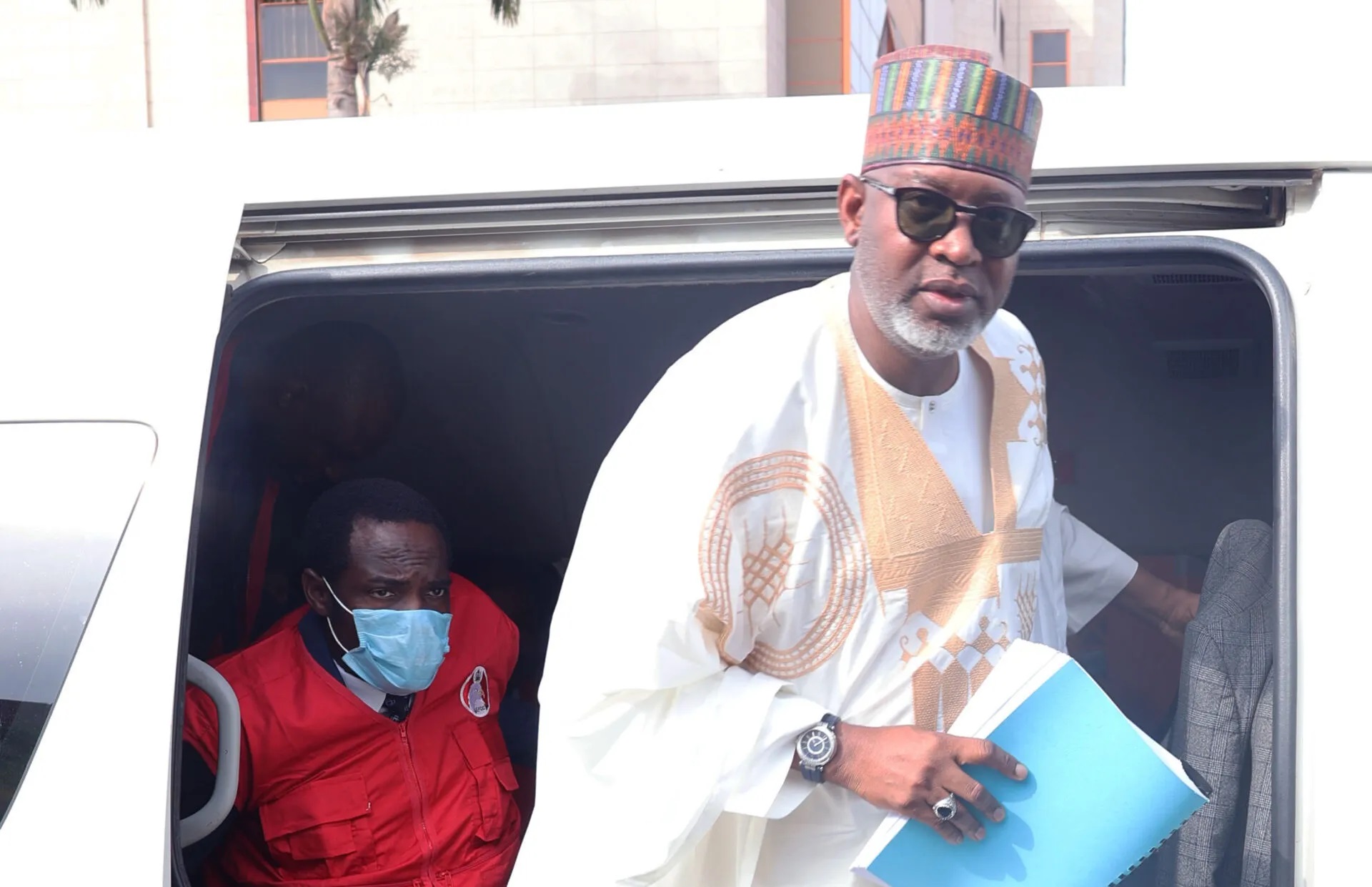General
Sirika, Two Others Get N100m Bail in Alleged N2.7bn Fraud Case

By Adedapo Adesanya
The Minister of Aviation under former President Muhammadu Buhari, Mr Hadi Sirika, has pleaded not guilty to the alleged corrupt practices involving about N2.7 billion brought against him by the federal government.
Mr Sirika was arraigned before Justice Sylvanus Oriji at the Federal High Court in Abuja on Thursday along with his daughter, Fatima, his son-in-law, Jalal Sule Hamma, and a firm – Al Buraq Global Investment Limited.
The daughter and son-in-law also pleaded not guilty to the six-count charges when read to them.
Following their denial of the fraud charges, their respective lawyers moved applications for their bail which was granted by the judge.
Justice Oriji admitted the three defendants on bail for N100 million and two sureties each in the like sum.
The sureties must be responsible citizens with verifiable home addresses while one of them must have landed property with a certificate of occupancy signed by the FCT Minister.
The judge ordered that the defendants must not travel out of the country without express permission of the court.
If unable to perfect the bail conditions, Justice Orijin ordered that they should be remanded in prison custody till the time of perfection of bail conditions.
The court fixed June June 10 for the commencement of the trial.
General
IBEDC Promises Stability, Growth After Board Restructuring

By Adedapo Adesanya
The Ibadan Electricity Distribution Company (IBEDC) has announced the reconstitution of its board following the resignation of three nominees of the Asset Management Corporation of Nigeria (AMCON), promising growth and stability.
Earlier this week, the disco, which serves Oyo, Ogun, Osun and Kwara States, as well as parts of Ekiti, Kogi and Niger States, unveiled its new board led by the new chairman, Mr Tunde J. Afolabi.
The newly constituted board include Mr Ayodeji Ariyo Gbeleyi, with Mr Michael I. Magaji as Alternate Director; Mr Taiwo Afolabi; Professor Oladapo Afolabi; Mr Tunde Fayinka; Mr Oluwaseyi Akinwale and Mr Adeolu Ijose.
According to the chairman, the emergence of a new core investor and the reconstituted board marks a significant milestone in the company’s corporate journey and signals a renewed strategic direction focused on stability, continuity and sustainable growth.
“This transition represents renewal, not rupture. It represents investment, not instability. It represents partnership, not division. Our goal is to strengthen governance, enhance operational performance, deepen capital investment and deliver improved service to customers across our franchise areas,” he added.
Mr Afolabi, while addressing customers directly, assured them that there would be no avoidable service disruptions as a result of the transition, stating that all IBEDC offices will remain open, while field operations will continue uninterrupted.
“The new core investor has committed to sustained capital investments in feeder rehabilitation and expansion, transformer upgrades and replacements, injection substation improvements, and the replacement of obsolete network components,” he stated.
He added that IBEDC plans to accelerate the integration of advanced digital and operational technologies, disclosing that these include enhanced outage management systems, strengthened billing platforms, expanded smart metering deployment, and digitised customer engagement channels aimed at improving transparency and service responsiveness.
On workforce stability, the chairman emphasised that there will be no job losses as a direct result of the transition, noting that the board, under his leadership, is committed to employee welfare, improved work tools, modern safety equipment, and technology upgrades to support field efficiency, while maintaining high performance standards.
Mr Afolabi also pledged proactive and structured engagement with regulators, including the Nigerian Electricity Regulatory Commission (NERC) and the Nigerian Electricity Management Services Agency (NEMSA), underscoring its commitment to full regulatory compliance, strengthened governance frameworks, transparency and accountability.
Furthermore, he reaffirmed the commitment of the distribution company to structured and timely payment cycles for vendors and suppliers, recognising their critical role in maintaining network stability.
With the new board in place, he insisted that IBEDC is poised to deepen operational excellence, strengthen financial sustainability, and position itself firmly on the path to becoming Nigeria’s leading power distribution company—powering progress across its franchise with unity, confidence and innovation.
Established in November 2013 following Nigeria’s power sector privatisation, IBEDC operates the largest distribution network serving the highest customer population within Nigeria’s electricity distribution landscape.
General
Eyesan Promises Enhanced Transparency, Digital Transformation at NUPRC

By Adedapo Adesanya
The chief executive of the Nigerian Upstream Petroleum Regulatory Commission (NUPRC), Mrs Oritsemeyiwa Eyesan, has promised to enhance transparency and ensure that the NUPRC’s internal communications are fully digital.
Mrs Eyesan said this when the Executive Secretary of the Nigeria Extractive Industries Transparency Initiative (NEITI), Mr Musa Adar, visited the commission’s corporate headquarters in Abuja.
“We have set for ourselves a 60-day programme to digitise our interactions and communications within the commission. I can assure you that once we get to day 60, there will be no paper trail within the Commission. All our transmissions will be electronic, which also means speed is assured. It means we will be able to trace where we have hiccups,” Mr Eyesan said.
The NUPRC boss said digitising processes often leads to better results, like the enforcement of payments of royalties.
“I can tell you without a shadow of doubt that for royalty payments, the default rate was enormous prior to 2025 when the Commission went live on the system. Now, compliance has improved,” Mrs Eyesan said.
The NUPRC boss sought a deepened relationship with NEITI, which will foster transparency, especially amid the 2025 Licensing Round.
In his remarks, the NEITI’s scribe said there was a need for the NUPRC to carry the agency along in its operations as this would not only enhance transparency but also deepen investor confidence.
Mr Adar also urged the commission to be firm on oil companies that run afoul of the Petroleum Industry Act.
Speaking on the Extractive Industries Transparency Initiative, Mr Adar asked that the NUPRC actively participate in the 2026 EITI flagship conference, which will provide the Commission with better insights into the standards that guide EITI implementation.
The NEITI boss also sought support from the Commission in the area of data sharing, which will enhance the operations of the agency.
“We are here to seek understanding, and we must collaborate,” Mr Adar said.
General
Tinubu Tasks Acting IGP Disu to Restore Peace, Strengthen Security Nationwide

By Modupe Gbadeyanka
The acting Inspector-General of Police (IGP), Mr Tunji Disu, has been charged to do everything within his powers to restore peace and strengthen security across the nation.
This task was given to the new police chief by President Bola Tinubu after being decorated at the State House in Abuja on Wednesday.
Mr Disu was chosen to succeed Mr Kayode Egbetokun on Tuesday. His appointment is expected to be approved by the Nigeria Police Council and confirmed by the Senate next week.
President Tinubu described Mr Disu’s appointment as coming at a critical moment, urging him to rebuild public confidence in the police’s capacity to do their job in collaboration with other security forces.
“I made this decision for you to assume this responsibility. I know your record. I saw the dedication you exhibited while you were in Lagos when I was governor,” the President said.
“Lead firmly but fairly, demand professionalism at every level and ensure that the safety of lives and property remains our highest priority. It’s a daunting challenge. I know you can do it. You have my word, you have my full support,” he added.
Mr Tinubu urged him to advance the security pillars of his administration’s Renewed Hope Agenda. He expressed confidence in the Acting IGP’s discipline, operational experience and leadership capacity.
“Nigeria is challenged with banditry, terrorism and other criminal activities. You will be part of the thinking and innovation to overcome them,” the President said, reaffirming his belief that Nigeria would prevail under a committed leadership.
The President also paid tribute to Mr Egbetokun, who was present with his spouse, saying, “We are a grateful nation. Nigeria appreciates your contribution to maintaining law and order.”
He urged Egbetokun to be ready to offer useful advice to his successor and wished him and his family peace, good health and success in future endeavours, noting,
“You have not succeeded without a good successor. His success will also be part of your legacy.”
Mr Tinubu urged all security stakeholders to work collectively to safeguard lives and property during this critical period.
-

 Feature/OPED6 years ago
Feature/OPED6 years agoDavos was Different this year
-
Travel/Tourism10 years ago
Lagos Seals Western Lodge Hotel In Ikorodu
-

 Showbiz3 years ago
Showbiz3 years agoEstranged Lover Releases Videos of Empress Njamah Bathing
-

 Banking8 years ago
Banking8 years agoSort Codes of GTBank Branches in Nigeria
-

 Economy3 years ago
Economy3 years agoSubsidy Removal: CNG at N130 Per Litre Cheaper Than Petrol—IPMAN
-

 Banking3 years ago
Banking3 years agoSort Codes of UBA Branches in Nigeria
-

 Banking3 years ago
Banking3 years agoFirst Bank Announces Planned Downtime
-

 Sports3 years ago
Sports3 years agoHighest Paid Nigerian Footballer – How Much Do Nigerian Footballers Earn

















